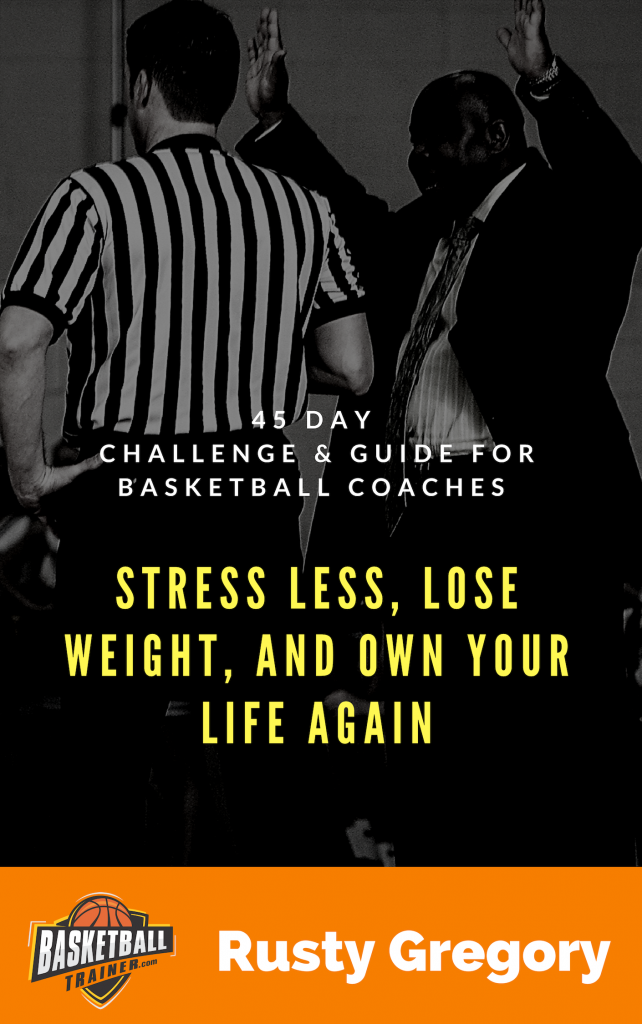“You can die coaching. I’m not trying to be funny, but it can kill you.”
–Herman Edwards, Arizona State head coach, former ESPN commentator, and head coach of the New York Jets and Kansas City Chiefs
With the hectic-ness of the football coaching profession, it is very easy and convenient to “let yourself go” when short on time. It has almost become the American mantra: work way too many hours while you deny all aspects of your health and wellbeing. The large amount of scientific evidence and what we know about human physiology suggests that chronic stress is second only to diet as the principal cause of modern disease. As football coaches it’s high time we get serious about the dangers of stress and how it is affecting our daily lives.
Stress is specific and individualistic in nature which explains why one situation stresses one person out while the same situation doesn’t for someone else; it’s not what you see that upsets you, it’s what you think you see. Whether your stress is real or perceived, regular healthy escapes are needed to help alleviate stress’s harmful effects. A diversion away from the thoughts of your stressor(s) can provide temporary relief, but it takes healthy lifestyle behaviors to appropriately treat the ongoing mental, physical, and emotional damage caused by your stress.
Stress And The Challenging Nature of Coaching Football
 Inevitably, your team will experience challenges throughout the course of a season. It is during these times that the unavoidableness of stress can explode through the roof. Realizing that your team will grow the most during this adversity is the first step in dealing with the resulting stress brought on by the not-so-perfect level of performance. The next step is to address the voices of the administration, parents, and the media that may not be so warm and welcoming. If left unaddressed, these and other sources of coaching stress will generate a level of pressure and anxiety that will grow and fester. Once this occurs and becomes your mode of operation, a chronic state of stress creates your new normal.
Inevitably, your team will experience challenges throughout the course of a season. It is during these times that the unavoidableness of stress can explode through the roof. Realizing that your team will grow the most during this adversity is the first step in dealing with the resulting stress brought on by the not-so-perfect level of performance. The next step is to address the voices of the administration, parents, and the media that may not be so warm and welcoming. If left unaddressed, these and other sources of coaching stress will generate a level of pressure and anxiety that will grow and fester. Once this occurs and becomes your mode of operation, a chronic state of stress creates your new normal.
Stress and Fight or Flight Response in Coaching
Most people are familiar with the feelings that accompany the immediate onset of a situation that produces a stress hormone release known  as the “fight-or-flight” or the stress response: increase in heart rate and respiration and a reduction of digestive activity leading to a loss of appetite. Managing the production of these stress hormones, cortisol, and adrenaline, is essential to keeping stress at the “healthy” level. If you cannot change the stressful situation in which you find yourself or how you perceive the situation, then having a plan in place to help off-set the hormonal release is critical in your stress-attack approach. For example, deep breathing exercises and meditation and prayer are relatively quick activities that can be performed in a moment’s notice. Helping a person in need or getting a massage are great stress-relieving ideas if time allows.
as the “fight-or-flight” or the stress response: increase in heart rate and respiration and a reduction of digestive activity leading to a loss of appetite. Managing the production of these stress hormones, cortisol, and adrenaline, is essential to keeping stress at the “healthy” level. If you cannot change the stressful situation in which you find yourself or how you perceive the situation, then having a plan in place to help off-set the hormonal release is critical in your stress-attack approach. For example, deep breathing exercises and meditation and prayer are relatively quick activities that can be performed in a moment’s notice. Helping a person in need or getting a massage are great stress-relieving ideas if time allows.
If a chronic state of stress develops, the drop in your coaching performance will be the least of your worries. Stress will deliver a devastating blow to your health that can lead to early resignation/retirement, increases in healthcare expenses and absenteeism, relationship problems, and even death. If you identify your stressors and have a plan of action in place to manage them, you are more likely to come out on top with little to no consequences.
The majority of our stress occurs when we lack a sense of control over a situation. We do, however, have control over how we cope with it. If you are unable to gain control over your stressor, such as an injury to a player or the breaking of team rules by one or more of your players, consequences follow. Stress affects us in two major ways: our health and our relationships.
Our Health And How The Stress of Coaching Football Affects Us
- How Stress Affects Our Health – Chronic stress is known to raise your blood sugar, increase glucose intolerance and belly fat, make you crave sugar, cause insulin resistance and type 2 diabetes, and reduce your ability to burn fat. Stress also leads to a negative outlook on life, obesity, burnout, depression, certain cancers, and emotional exhaustion.
- Choosing Unhealthy Behaviors to Cope – Too often, we cope with our stress by ignoring it or choosing unhealthy behaviors that are quick, convenient, and easy in the given moment. Unfortunately, these choices only compound the problem that stands in front of us. They offer a temporary “relief” from our stress but create monster problems down the road. Sadly, it is more common to see people choose comfort food, overeating, smoking, recreational drugs, excessive drinking, and other reckless behaviors, to relieve themselves of the uncomfortableness of their feelings.
- Exercising Stress Management Skills to Alleviate Stress – Stress is unavoidable and we will ALL experience it to some degree or another. How you choose to deal with it is entirely up to you. Choosing activities and behaviors on a daily basis that are health-promoting and stress-reducing will generate a greater sense of health and wellbeing. As a result, the health of your relationships, job performance and life satisfaction will excel.
Our Relationships As Football Coaches
- Spouse – Couples in less stable relationships are inclined to suffer more from your coaching stress than those in more stable marriages because they tend to be more affected by daily events. To be a successful coach and involved in a stable relationship requires a spouse that truly understands the time demands placed on a football coach. Many relationships where one spouse is holding it together don’t tend to thrive.
- Children – Your kids lack the “skills” and life experience that a spouse may have to endure the long, stressful hours that your coaching job requires. Research indicates that a father’s mental health (from stress) has a long-term affect on their children’s ability to demonstrate self-control, cooperation, and feel important. Studies also show that kids who have fathers who aren’t at home because of work commitments have a lack of focus, motivation, and self-discipline. All of this adds up to constant tension at home leading to kids who become disengaged. The incidence of drug and alcohol abuse to numb emotions, depression, teen pregnancy, sexually transmitted diseases, and suicide increases in children who are exposed to chronic, toxic stress.
- Extended Family – Spending time with extended family can be extremely stressful. This tends to be at its highest during the holidays or prolonged visitations. When your coaching stress is added to the potential stress and anxiety associated with your/your spouse’s family, i.e. in-laws, disaster looms.
- Close Friends – One study found that people who observe others who are in a stressful situation responded with a stress response of their own (empathetic stress); an actual 26% increase in cortisol (stress hormone) production. The observer’s feelings of anxiety and tension became more intense if the observer had a relationship with the participant. Imagine one of your closest friends is going through a tough time during one of your stressful times; this could be very difficult to navigate. This situation could damage the relationship by destroying the communication between the two of you.
- Coworkers – It is not uncommon to spend more time with your coaching staff than with your own family. An everyday work schedule of ten, twelve, or more hours a day with your staff when they are experiencing a high level of stress, can have a tremendous effect on you. Not only is the contagiousness of their stress amplified when you spend long hours at work, but you are more likely to take that stress home to your family.
Now that we have outlined some of the causes and relationships affected by stress, stay tuned for our next article on Stress Management Techniques to help cope with and handle stress successfully.
Ready To Make Some Changes In Your Life for The Better? Take This Course and Challenge NOW!

 Rusty Gregory, MS, CSCS is the coauthor of Living Wheat-Free for Dummies (Wiley Publishing). He received his B.S. (Commercial and Industrial Fitness, Minor in Health Education) in 1989 from Texas Tech University and his M.S. (Kinesiology) in 1991 from the University of Michigan. In 1991, he began his personal training business in Austin, Texas, and became a Certified Strength and Conditioning Specialist (CSCS) with the National Strength and Conditioning Association (NSCA). In 1995, he opened Forte Personal Fitness, a private personal fitness studio where he trains athletes from a multitude of sports and people of all ages, health backgrounds, and physical limitations. He and Austin basketball trainer Chris Corbett produce content to help support coaches, trainers, and dedicated young athletes on the platform BasketballTrainer.com and in Coachtube.com.
Rusty Gregory, MS, CSCS is the coauthor of Living Wheat-Free for Dummies (Wiley Publishing). He received his B.S. (Commercial and Industrial Fitness, Minor in Health Education) in 1989 from Texas Tech University and his M.S. (Kinesiology) in 1991 from the University of Michigan. In 1991, he began his personal training business in Austin, Texas, and became a Certified Strength and Conditioning Specialist (CSCS) with the National Strength and Conditioning Association (NSCA). In 1995, he opened Forte Personal Fitness, a private personal fitness studio where he trains athletes from a multitude of sports and people of all ages, health backgrounds, and physical limitations. He and Austin basketball trainer Chris Corbett produce content to help support coaches, trainers, and dedicated young athletes on the platform BasketballTrainer.com and in Coachtube.com.